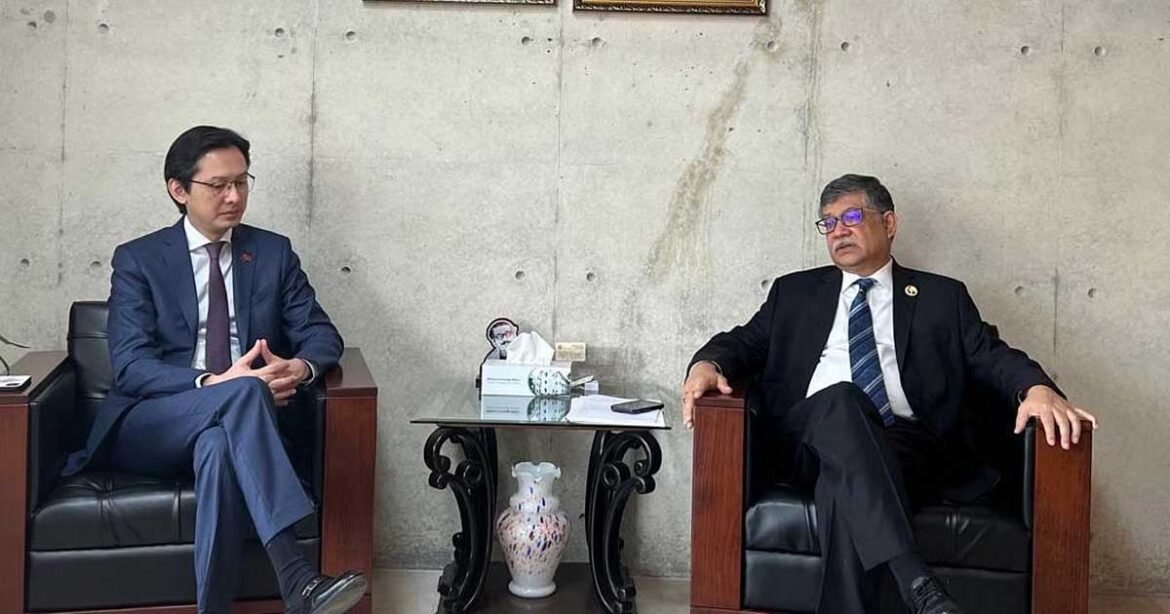As Bangladesh prepares to deviate from its least developed country (LDC) status in 2026, Vietnam and Bangladesh have expressed a desire to explore the possibility of establishing a Free Trade Agreement (FTA) to enhance bilateral trade and economic relations.
Recently, at the second Bangladesh-Vietnam Foreign Office Consultations held in Dhaka, both parties discussed the possibility of signing a free trade agreement (FTA) to further strengthen bilateral trade and economic ties. Vietnam and Bangladesh have recently decided to analyze the possibility of concluding a free trade agreement to further strengthen their bilateral economic and trade ties.
You Can Also Read: BANGLADESH TO REVISE TRADE NEGOTIATIONS BEFORE LDC GRADUATION
The Second Foreign Office Consultations (FOC) between Bangladesh and Vietnam held on Sunday at the Ministry of Foreign Affairs in Dhaka. The focus of the consultations was on expanding bilateral trade and economic relations. Foreign Secretary (Senior Secretary) Ambassador Masud Bin Momen led the Bangladesh delegation, while Deputy Foreign Minister Do Hung Viet led the nine-member Vietnamese delegation.
What were the key focusing areas?
The broad range of bilateral relations was discussed, including cooperation in the areas of trade and commerce, investment, energy, halal trade, tourism and culture, education, health, defense and security, agriculture, fisheries and livestock, ICT and telecommunications, direct air links, etc.
Exchanging views on mutual interest:
The Bangladeshi and Vietnamese counterparts exchanged views on regional and international issues of mutual interest. Both parties expressed optimism that the FOC, which was held after a hiatus of nearly six years, would significantly contribute to strengthening the existing bilateral engagements. They expressed satisfaction with the current level of bilateral cooperation and highlighted the importance of enhancing synergies through the prudent use of available complementarities.
Attention in enhanced air links:
Direct air connections were emphasized by both parties as a means to increase business, investment, tourism, and personal interactions. Both Dhaka and Hanoi agreed to determine the feasibility of launching direct flights as soon as possible.
Utilization of opportunities and facilitating comprehensive cooperation:
Secretary Momen encouraged Vietnamese companies to take advantage of the opportunities presented by Bangladesh, particularly in its economic zones, during the consultations.
Reports in Bangladeshi media highlighted Momen’s request for the Association of Southeast Asian Nations (ASEAN) to quickly include Bangladesh as a sectoral dialogue partner. He also asked Vietnam to play a more proactive role bilaterally and within the ASEAN framework to expedite the Rohingya people’s repatriation from Bangladesh to Myanmar.
In addition, Bangladesh proposed the formation of a foreign minister-level joint commission to facilitate comprehensive cooperation between the two nations.
Welcoming more bilateral meetings and discussions:
Both parties lauded the regularity of bilateral dialogue and encounters. The heads of delegation anticipated that this second FOC would inject additional vitality and momentum into the already excellent bilateral relations, making them more collaborative, constructive, and productive. The next FOC will be conducted at a mutually convenient time in Vietnam.
The meeting was appreciative of the joint celebration of the Golden Jubilee of Diplomatic ties between the two friendly countries with commemorative programs in Dhaka and Hanoi.
Importance of bilateral FTAs
As soon as Bangladesh reaches middle-income status, it needs to pursue a bilateral FTA for trade benefits. Without FTAs, Bangladesh will lose competitive advantages to nations like India, Pakistan, and Vietnam, which have FTAs with a number of their trading partners. As a least developed country, Bangladesh currently enjoys duty-free market access to the European Union, Canada, Australia, Japan, and other nations.
The United Nations (UN) has strongly advised Bangladesh to establish free trade agreements (FTAs) with major trading partners such as China in order to avoid a system devoid of duty-free access following its graduation to developing nation status. As the effectiveness of multilateral trading systems governed by the World Trade Organization (WTO) progressively declines, bilateral FTAs are gaining importance in global trade. The number of such agreements exceeds 200 around the world.
Bangladesh will need to keep expanding bilateral ties with the main trading partners for PTAs and FTAs, as the erosion of trade preferences will have a significant impact on trade after graduation. Strengthening bilateral ties with Vietnam and FTAs will assist Bangladesh in the future, as it will allow both nations to enjoy duty benefits. Moreover, Bangladesh exported $61.29 million worth of goods to Vietnam while imported $678.6 million in 2022.


